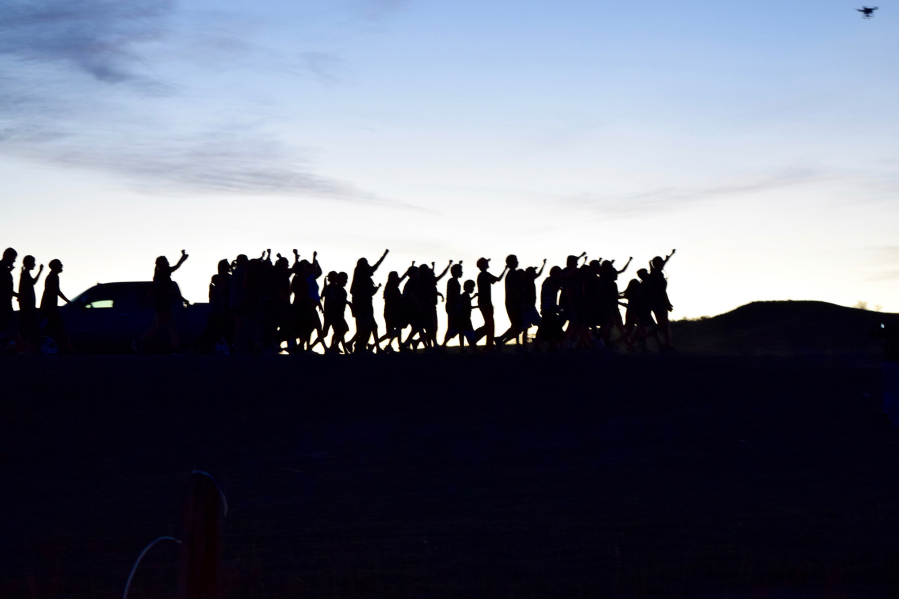When Portland journalist Jacqueline Keeler arrived in North Dakota to write about and participate in protests against the Dakota Access Pipeline, she saw not just an encampment of protesters. She saw a reflection of the history of her people.
Keeler, a Navajo and Yankton Dakota Sioux writer living in Portland, spent a week in October and another in December at the encampments where thousands of Native Americans from hundreds of tribes and their allies gathered to protest a 1,170-mile oil pipeline that set off a firestorm of debate and controversy late last year.
“This is a historical event,” Keeler said. “I had to see it for myself.”
Next week, Keeler will kick off a five-week winter course called “The Return of the Great Sioux Nation” through Clark College’s Mature Learning program, which offers not-for-credit classes to the community. The classes will be held at 1:30 p.m. Mondays through Feb. 13.
Clark College staff member Anna Schmasow, a Dakota tribal member who helps organize the college’s annual powwow, reached out to Keeler to encourage her to develop the program.
If You Go
What: Clark College’s Mature Learning class, “The Return of the Great Sioux Nation.”
When: Begins 1:30 p.m. Monday. The class will run for five weeks with a break on Martin Luther King Jr. Day, ending Feb. 13.
Where: Clark College at Columbia Tech Center, 18700 S.E. Mill Plain Blvd.
Details: There is a $58 fee. To register online, visit ecd.clark.edu/classes/ and search under Mature Learning, or call 360-992-2939.
“It’s an education opportunity for something that’s going on right now,” Schmasow said. “It’s a movement.”
The pipeline, which would transport oil from the Bakken oil fields of North Dakota and Montana to Illinois, was slated to run through North Dakota’s Lake Oahe, a Standing Rock Sioux burial site and a major source of drinking water. Protesters argued that the potential for a leak or burst of the pipeline would be devastating.
The Army Corps of Engineers denied a permit for the construction of the section in December. But with President-elect Donald Trump’s team announcing that the Republican supports completing the project, that victory for opponents of the project could be short-lived.
Economic and Community Development project manager Tracy Reilly Kelly notes that will likely make for dynamic and exciting classroom discussion.
“We are just salivating with excitement to think about what kind of content is going to be news,” Reilly Kelly said.
‘Part of our DNA’
The Standing Rock area in North Dakota holds special significance for Keeler, whose family lived there for generations. Family photos show the Hunkpapa Lakota tribe’s perhaps best known leader, Sitting Bull, who led the tribe in resistance efforts against the United States government in the Battle of Little Bighorn, on house arrest at Keeler’s family’s farm.
“They still have this great love for us,” Keeler said of members of the Standing Rock Sioux.
But Keeler, who wrote on the topic prior to going to North Dakota thanks to her sources at “every level of tribal government,” could only say so much without being there to witness the protests herself. Keeler described finding a collaborative living environment she said threw back to native people’s historical ways of living. “This is what has unified and brought people together, and people voting with their feet,” she said.
Protesters gathered in a camp circle society, sharing goods and supporting each other. They woke at 6 a.m. to pray. Keeler said people she spoke to told her they felt like better people as a result of living together in the camp.
“It was very, very painful for us to give up that way of life, to stop living in this camp circle societies,” she said. “Seeing our people living that way again, you could see how it’s part of our DNA.”
But the story of the Dakota Access Pipeline protests is not over, Keeler acknowledges, and said her class will be closely watching and discussing action in the coming months.
“It’ll be very interesting to see what’s going to happen,” she said.




